Differentiate Your Law Firm… Even if You Already Think You Do
Law firms have debated the question of how to differentiate for decades. They invest in branding, website redesigns, and innovative thinking to show they differ from their competition. But, at the end of the day, are they still making the same differentiation mistakes?
This article outlines six ways that law firms and lawyers think they are differentiating themselves and identifies ways for firms and lawyers to actually do it successfully.
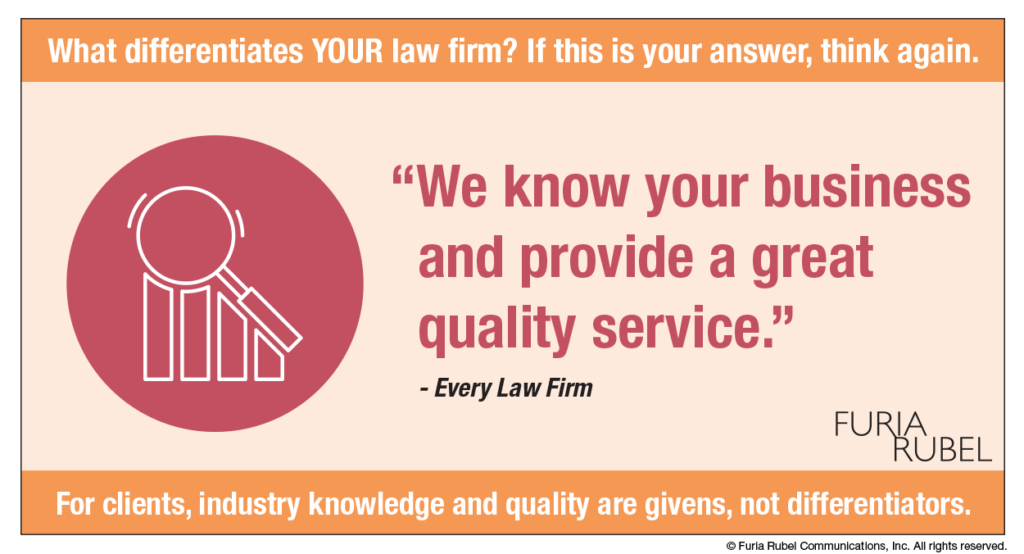
1. “We know your business and provide great service.”
It’s not enough to say your firm delivers exceptional service because great service is a client expectation not a differentiator. Law firm leaders need to understand how to identify true differentiators that are relevant and meaningful to their target clients and how to market those differentiators.
To start, focus on how much your legal services are worth because competition from alternative legal service providers will continue to grow and capture market share. To find out what your services are worth:
- Find out what your clients seek.
- Measure your clients’ perceived value.
- Determine a win-win price point.
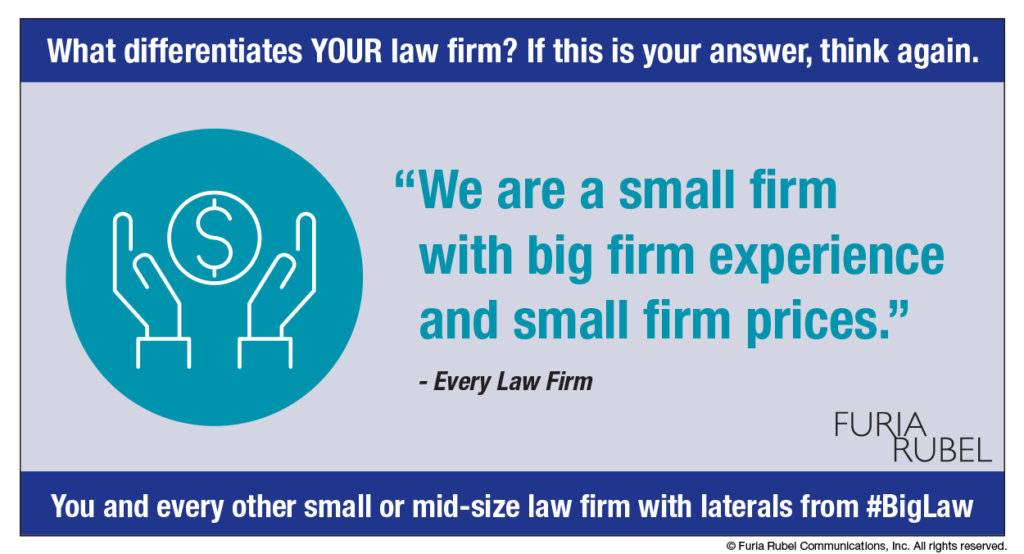
2. We are a small firm with big firm experience and small firm prices.”
Furia Rubel receives calls regularly from small- to mid-sized law firms that want to differentiate themselves from the large law firms and mega firms with whom they compete. Frequently, these law firms are situated just outside major metropolitan areas and have several lawyers who have big firm experience.
We ask these firms:
- What do you want to achieve as a result of your marketing? What are your quantifiable objectives? (i.e., grow the business by X percent; grow the business by X number of attorneys; increase profits per partner)
- How do you want your law firm to be perceived? What do you want your audience to think about your firm?
- Who are your target audiences and who are the decision makers within that audience? (i.e., individuals; in-house counsel; procurement agents; C-level executives)
Once we’ve established some of the foundational elements for the marketing strategy, we ask: What differentiates you from your competition?
To answer “What differentiates you from your competition?” know how to answer these client questions:
- How can you help me?
- What are the benefits of working with you?
- What are the benefits of working with your law firm?

3. “We are the best, smartest, and really good at what we do.”
You may be smart and really good at what you do, but how do you stand out? One way to stand out is to offer great customer service by adding personal touches that keep you front-of-mind with your client.
Some examples to help you stand out from the crowd:
- Send a client a birthday card or lunch invitation to catch up.
- Send a thank you card after a case is finished.
- Send a written survey for client feedback.
- Reach out to them on LinkedIn to acknowledge a promotion or accolade.
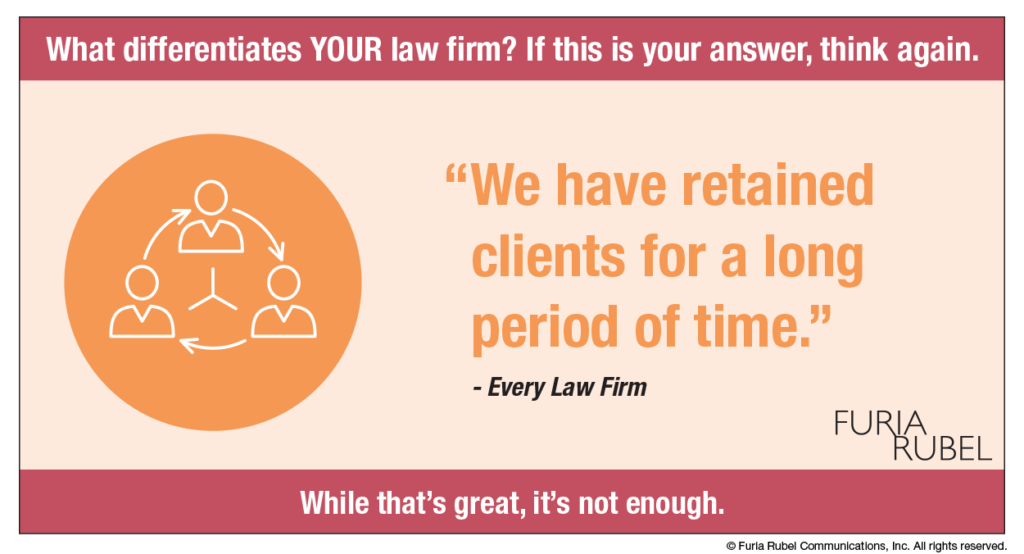
4. “We have retained our clients for a long time.”
You must be doing something right if your clients are staying with you. Continue prioritizing retention as part of your annual marketing plan. It costs much more to acquire a new client than maintain an existing client.
How does your firm differentiate itself to get new clients? To answer this question, start by asking existing clients for recommendations and testimonials. Recommendations and testimonials are a great way for you to highlight your legal prowess from the client perspective.
A great way to use testimonials and recommendations is in on your bio. Instead of leading with your law school or practice group, lead with a recommendation such as “Described by clients as ‘exceptional’ and ‘a true lawyer’s lawyer,” Joe Smith…”
Don’t have any recommendations? Email your clients and ask. “I was hoping you might have some feedback after our work together on the M&A.” You can also request a recommendation from your connections through LinkedIn.
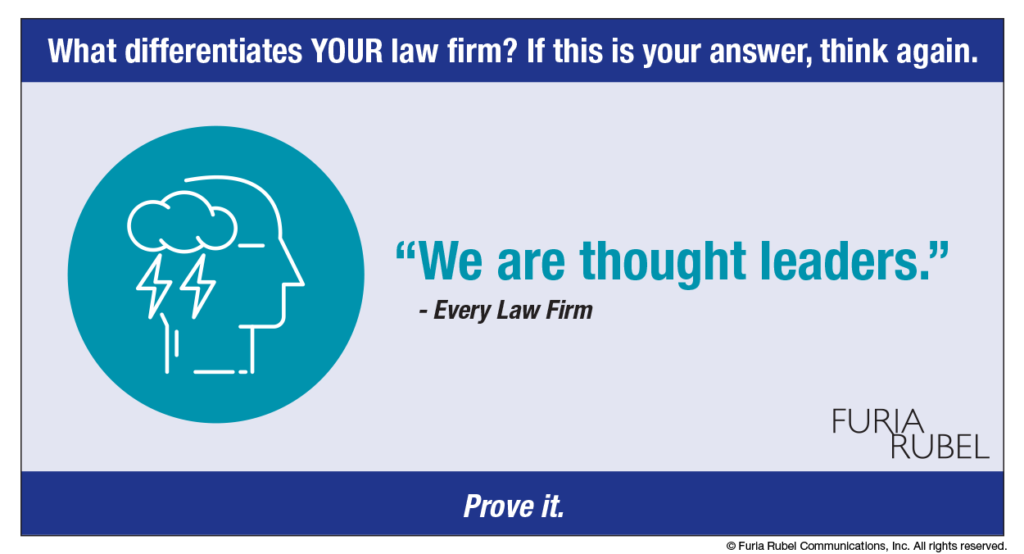 5. “We are thought leaders.”
5. “We are thought leaders.”
A thought leader blogs, networks, publishes articles, speaks at industry events, is active on social media, and updates their website regularly. Are you truly a thought leader or just think you are? If you would like to be a thought leader but don’t know where to start, decide what you like to do best. Would you rather write than speak? If so, write an opinion-editorial or volunteer to write for your firm’s blog. Whatever you choose, own your reputation by keeping visible online or in-person and by leaving a lasting impression on everyone you meet.
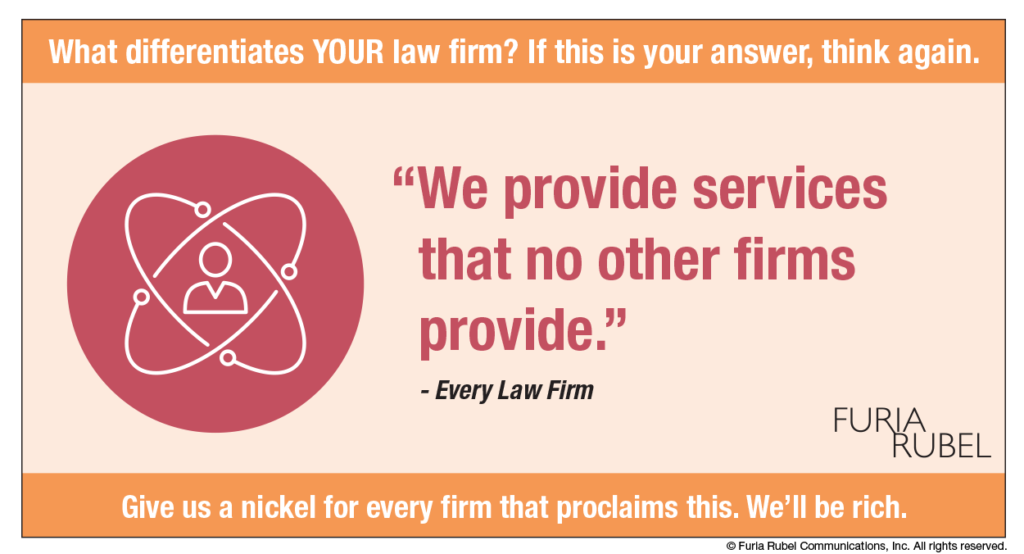
6. “We provide services that no other firms provide.”
It’s important to recognize and develop the hidden differentiator gems that exist within your own practice groups. Partners within the same group need to consistently communicate new ways they are handling matters or openly discuss how they are working with new technologies in innovative ways.
Once you have discovered what differentiates your practice groups, optimize your web site in the areas where you have the greatest amount of expertise. Don’t try to be everything to everyone. Clients know your strengths.
Benefits of Differentiation
The bottom line is that differentiation means just that. Provide information of value to those seeking legal services. You can really make your law firm stand out if you think outside the box. You will find that successful and innovative law firms challenge the way things have always been done in the past. And sometimes it is the smallest gestures in customer service that make the biggest impact on client satisfaction. Sending a handwritten thank you note does not go unnoticed in this day and age of email and texting. Excelling at customer service is one of the easiest ways to differentiate yourself from the crowd.
As the Big Four gain momentum across the legal market and competition from alternative legal services increases, focus on creating value to your clients, understand how you want to be perceived, understand how to be a successful thought leader, and know your firm’s strengths.


